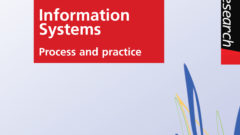To Improve Your Information Systems, You Must Understand the Architecture

Information Systems: Process and Practice
Editors: Christine Urquhart, Faten Hamad, Dina Tbaishat, and Alison Yeoman
Publisher: Facet Publishing
Publication Date: December 2017
Length: 288 pages
Price: $89
ISBN: 978-1783302413
In Information Systems: Process and Practice, Christine Urquhart and a group of highly respected researchers study the concept of information architecture (IA) within information systems (IS) management. The book explores how IA can help library science and other information professionals meet the challenges of today’s technology-driven world and capitalize on the power of data management.
Two Areas of Focus
The editors intend this book to be of interest to information professionals across many disciplines. A key objective is to provide a diverse selection of research topics with unique views of IA approaches. The book focuses on two general information areas: library science (chapters 2 through 10) and health informatics/clinical research (chapters 12 through 14).
The introductory chapter is critically important because it details the methodology used to organize the topics. The chapters cover a variety of IS and IA topics, each by different editors. The introduction explains how these somewhat disparate research topics come together to form a comprehensive study. Each chapter also has an introductory section summarizing its content.
Three Main Takeaways
The book is an especially good resource for anyone who is working in the library science profession, wanting a better understanding of IA’s capabilities, or seeking improved methods to provide information services to customers. Here are three important takeaways:
- User behavior should influence IA design. Most information professionals will agree that user experience, which is often referred to as UX, should be a key consideration of any IS with a user interface. Unfortunately, the value of maximizing UX is underappreciated by many system developers. Through real-world examples, research, and case studies, the book frames the challenges and opportunities that UX design poses for an IS. The editors provide valuable advice and potential solutions for improving website design, system interfaces, workflows, and processes.
- Technology has significantly influenced the evolution of the information pro’s skillset. Several chapters provide details about how technology has impacted the library science profession by transitioning job requirements toward a more digital skill set, driven by an increasing demand for digital resources and the necessity to support the digital needs of customers. The information field is rapidly becoming one primarily focused on data (unstructured and structured). The book details how the evolution of required technology skills for library science professionals has resulted in new opportunities and roles. It is now incumbent upon the library science profession to take advantage of these roles and opportunities, just as it is for all information professionals.
- IA research should know no boundaries. The editors provide a diverse collection of IA topics from multiple disciplines that relate to each other. The purpose is to exemplify how IA research is applicable to the information professions in general. The editors hope the book encourages further research in these areas and the sharing of research across disciplines.
A ‘Must Read’ for Some
The book is an easy and informative read. Information professionals will find its coverage of the IA topics applicable to their jobs. However, given the book’s heavy focus on library science and health informatics/clinical research, other information practitioners should first read the introduction to determine the book’s overall scope and which chapters will be of most benefit.
For library science professionals, the book is a “must read.” The first 10 chapters contain examples and case studies from the field. While the research on IA, process analysis, and content evaluation will be beneficial to all readers, it is particularly applicable to those responsible for library administration and service provision. The book speaks directly to the service provision challenges faced by the modern library science professional and provides examples of design and procedural approaches that address an increasingly digital environment.
The book is more of a “should read” for healthcare professionals and clinicians. The final three chapters provide valuable research and case studies that inform on ways to better access and share medical information and data, especially when distributed across systems and geographies. The clinician will find Chapter 14 particularly valuable in its coverage of ways to evaluate voluminous clinical data in a structured manner. It should be a great resource for any library science scholar, healthcare professional, clinician, and others doing research on IA. Each chapter is excellently researched and referenced, containing more than 500 works cited.
About the Author

- Brett Wise, IGP, CRM, FIP, CIP, has been in the information field for nearly 14 years. He is a records and information management professional in the financial services industry who is completing a master’s degree in IM systems from the Harvard University Extension School. Wise, who routinely speaks to organizations on various information topics, has five key industry certifications, including Information Governance Professional, Certified Records Manager, Certified Information Privacy Professional, Certified Information Privacy Technologist, and Certified Information Professional. Wise can be contacted at brettwise@hotmail.com.
